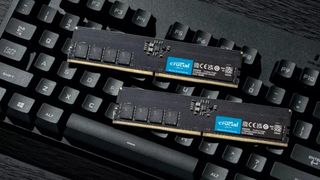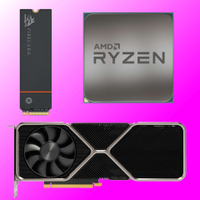Micron outs 24GB and 48GB DDR5 modules but your games don't care
Increased capacity not relevant for gaming, for now...

Is 48GB of system memory the next gold standard for PC gaming? It's at least physically possible now that Micron has launched new DDR5 DIMMs in 24GB and 48GB capacities.
Based on Micron's latest CL46 1.1V DDR5, the new formats are available running at 5200MT/s and 5600MT/s. They also support AMD EXPO and Intel XMP 3.0 profiles for smooth and easy compatibility with AMD’s Ryzen 7000 series and Intel’s 12th and 13th generation Core processors (via Tom's Hardware).
For PC gaming, the new capacities are not immediately compelling. While 24GB sounds like an interesting mid-point between 16GB and 32GB, you'll need two of the 24GB sticks to operate in optimal dual-channel memory mode. And anything beyond 32GB is pretty much overkill for games. So, one stick of 24GB won't do and two sticks is really too much.
On that note, we do slightly fear that some system builders may be tempted to chuck a single stick of 24GB DDR5 in a rig in single-channel mode as a cheap way of offering what looks like a decent uptick on the usual 16GB and fail to advertise the sub-optimal configuration.
After all, Forsaken's recommended specs includes a 24GB mid-point, something that's only possible in an optimal dual-channel configuration with some funky 4GB sticks alongside 8GB sticks. Something you don't ideally want, at the very least.
One other issue that's not 100% clear is maximum memory capacity support. In theory four of these new 48GB DIMMs slotted into your rig would make for 192GB total. Both Intel 13th Gen and AMD Ryzen 7000 CPUs top out at 128GB and we do not believe that will change with the arrival of 48GB DIMMs.
Anyway, no doubt 48GB of RAM will eventually become mainstream and a useful thing for gaming. And Micron's new DIMMs are the first step in that journey, on the hardware side at least.
The biggest gaming news, reviews and hardware deals
Keep up to date with the most important stories and the best deals, as picked by the PC Gamer team.
Best CPU for gaming: Top chips from Intel and AMD
Best gaming motherboard: The right boards
Best graphics card: Your perfect pixel-pusher awaits Best SSD for gaming: Get into the game first

Jeremy has been writing about technology and PCs since the 90nm Netburst era (Google it!) and enjoys nothing more than a serious dissertation on the finer points of monitor input lag and overshoot followed by a forensic examination of advanced lithography. Or maybe he just likes machines that go “ping!” He also has a thing for tennis and cars.
Most Popular







